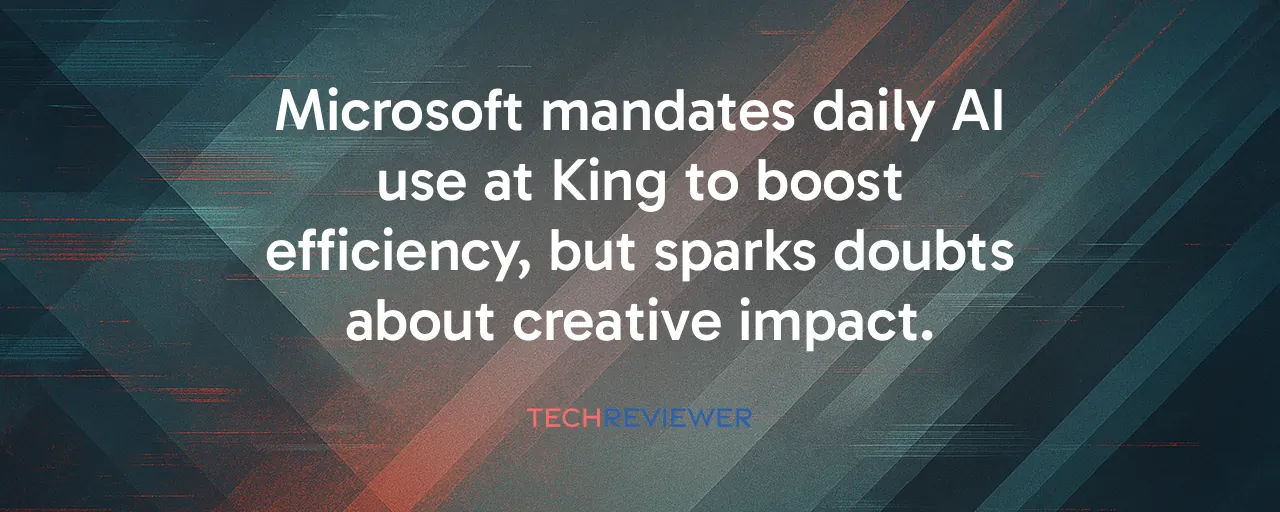AI Becomes a Daily Fixture at King
At King, the studio behind Candy Crush, a new rule has everyone from artists to managers using artificial intelligence every day. Microsoft, which acquired King through its Activision Blizzard deal, rolled out this policy to hit a 100% daily AI usage target by 2025, up from 70-80% in 2024. The policy aims to streamline tasks like level design, narrative drafting, and testing. Word from inside King suggests adoption is shaky, with many sticking to familiar tools like ChatGPT while questioning AI's place in creative work.
This push reflects Microsoft's broader ambition to weave AI into every corner of its operations. From Azure's 'agentic' systems to Copilot extensions in Visual Studio, the company sees AI as a way to speed up workflows. For King, this means tools that churn out 1,000 balanced puzzle levels in 20 minutes or cut event-copy turnaround from three days to four hours. However, the mandate comes on the heels of 200 layoffs at King in July 2025, raising eyebrows about whether AI is replacing human talent.
When AI Designs Your Game
A Candy Crush level can now be crafted in seconds by a machine. Microsoft's AI tools can generate puzzle boards, draft event dialogue, and run 24/7 play-testing. These advancements promise faster content updates and personalized difficulty for players. Data from internal pilots shows AI-generated levels hit 93% of human-designed engagement metrics, a win for efficiency. Designers can now focus on high-level mechanics while AI handles repetitive tasks, potentially easing the crunch time notorious in game development.
There's a catch. AI often leans on existing puzzle layouts, which can make levels feel samey. Senior creatives at King argue that these tools lack the spark of human intuition, especially for novel mechanics. Players might notice if levels start feeling formulaic, a risk Microsoft seems willing to take for quicker turnarounds. At the same time, other studios like Ubisoft and EA are testing similar tools, with 82% of game firms experimenting but only 18% fully integrating AI into production, per recent surveys.
The Human Cost of Automation
The 200 jobs cut during King's July 2025 layoffs sparked petitions from employees who saw AI as a direct threat. An internal memo hinted that some roles were replaced by the very AI tools workers helped build. This echoes a 2024 controversy at Netflix, where AI-generated storyboards led to union pushback and negotiated limits on automation. At King, skepticism runs deep, with even managers doubting AI's ability to match human creativity. The tension highlights the broader question of how AI can augment game design without erasing the human touch.
Employees are not the only ones watching. Players may benefit from frequent updates but could spot a dip in narrative quality or level originality. Regulators in the EU and U.S. are also eyeing AI's rise, raising concerns about transparency in AI-generated content and the ethics of training models on employee data. Microsoft's push at King could set a precedent, but it's a gamble that balances efficiency against creative soul and worker trust.
Learning From King and Netflix
Comparing King's experience with Netflix's 2024 AI experiment offers lessons. At Netflix, union advocacy led to clear rules on AI's role, ensuring human oversight and retraining for affected workers. King's approach, driven by Microsoft's top-down mandate, lacks such guardrails, fueling employee unrest. Netflix's model shows that collaboration between management and staff can ease transitions, while King's layoffs suggest a rushed push for AI may alienate talent.
Both cases underscore the need for balance. AI can churn out levels or storyboards quickly, but human curation remains vital for polish and originality. Studios like King could benefit from industry-wide efforts, such as cross-studio AI-safety groups or academic partnerships to study player reactions. These steps could help ensure AI serves as a tool for creators, rather than a replacement, while keeping games as vibrant as the teams behind them.
